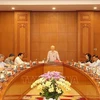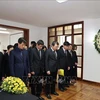Hanoi, (VNA) - Some provincial departments might be merged in keeping with the Government’s commitment to streamline its notoriously clunky and bloated bureaucracy, according to a new draft resolution circulated by the Ministry of Home Affairs (MoHA).
The idea is generally well-received by the public, however, experts and people in the know caution that further study is needed, otherwise such reforms could result in counter-productive disarray rather than achieving their ambitious goal.
Specifically, local departments of planning and investment would merge into the departments of finance to form departments of planning and finance. Provincial departments of transport would merge with the departments of construction, or, in Hanoi and HCM City, with the municipal departments of planning and architecture, to form a department of transport, construction, and urban development.
In addition, the draft law allows localities to decide whether to set up specialised departments. The Department of Science and Technology is optional and its functions can be folded into the Department of Education and Training.
The Department of Information and Communications, which provides counsel for provincial People’s Committee on management of media and IT matters, is also optional for provinces with sparse populations; its duties can be carried out by the Department of Culture, Sports and Tourism.
Department of Tourism will only be set up in places with a recognised natural or cultural heritage and with tourism sector contributing over 10 percent for five consecutive years to its Regional Gross Domestic Products (RGDP).
In the draft, MoHA also limited the number of directors and officials in provincial departments and lower level offices.
Experts say the proposal is likely to meet with strong resistance, especially from those departments that would be merged, however the efficiency of State management must be the overriding goal. According to the MoHA survey, 19 of 63 provinces and municipalities in the country are still not completely on board with the new draft.
The Hanoi People’s Committee argued that the capital city is a vast area, with a heavy workload, while State management competence remains at a “developing” level. Therefore, consideration is advised and implementation must be conducted in phases, preventing a sudden deluge of work.
Chairman of the HCM City People’s Committee Nguyen Thanh Phong and other heads of related agencies are also against the idea of "super-departments", saying the increased workload of a sprawling metropolis combined with staff cuts would create severe bureaucratic bottlenecks.
According to Thang Van Phuc, former Deputy Minister of Home Affairs, the proposed merging of provincial departments is an absolute necessity. He also said the proposal is not actually new, having been floated nearly 20 years ago at a Party Plenary in 1999.
“However, the idea never came to be realised due to a lack of determination. This led to the current state of administration where overlapping jurisdictions and inefficiency are rife,” Phuc said.
He said developed nations only have 12 to 15 ministries, while Vietnam has 22 ministries and ministry-level agencies, but “service delivery to the public is certainly not on a par,” in addition to wastefulness.
Responding to the concern that mergers might cause a sudden and possibly crippling influx of work for State administrations, Phúc said the concern stems from "a controlling mind-set" - the State tries to be all and everything, spreading themselves too thin. "If local departments focus on development of policies and carrying out inspection duties, overload will not happen," he said.
Pham Sy Liem, Vice Chairman of the Vietnam Construction General Association, while favouring the idea maintained that it would have far-reaching impacts. "It’s best to pilot it in a number of provinces first before implementing it nationwide," he said.
“We’ve tried merging and separation like this several times already, and a slew of problems and loss and confusion resulted each time. It took quite some time before things settled back to normal,” Liem said.-VNA
The idea is generally well-received by the public, however, experts and people in the know caution that further study is needed, otherwise such reforms could result in counter-productive disarray rather than achieving their ambitious goal.
Specifically, local departments of planning and investment would merge into the departments of finance to form departments of planning and finance. Provincial departments of transport would merge with the departments of construction, or, in Hanoi and HCM City, with the municipal departments of planning and architecture, to form a department of transport, construction, and urban development.
In addition, the draft law allows localities to decide whether to set up specialised departments. The Department of Science and Technology is optional and its functions can be folded into the Department of Education and Training.
The Department of Information and Communications, which provides counsel for provincial People’s Committee on management of media and IT matters, is also optional for provinces with sparse populations; its duties can be carried out by the Department of Culture, Sports and Tourism.
Department of Tourism will only be set up in places with a recognised natural or cultural heritage and with tourism sector contributing over 10 percent for five consecutive years to its Regional Gross Domestic Products (RGDP).
In the draft, MoHA also limited the number of directors and officials in provincial departments and lower level offices.
Experts say the proposal is likely to meet with strong resistance, especially from those departments that would be merged, however the efficiency of State management must be the overriding goal. According to the MoHA survey, 19 of 63 provinces and municipalities in the country are still not completely on board with the new draft.
The Hanoi People’s Committee argued that the capital city is a vast area, with a heavy workload, while State management competence remains at a “developing” level. Therefore, consideration is advised and implementation must be conducted in phases, preventing a sudden deluge of work.
Chairman of the HCM City People’s Committee Nguyen Thanh Phong and other heads of related agencies are also against the idea of "super-departments", saying the increased workload of a sprawling metropolis combined with staff cuts would create severe bureaucratic bottlenecks.
According to Thang Van Phuc, former Deputy Minister of Home Affairs, the proposed merging of provincial departments is an absolute necessity. He also said the proposal is not actually new, having been floated nearly 20 years ago at a Party Plenary in 1999.
“However, the idea never came to be realised due to a lack of determination. This led to the current state of administration where overlapping jurisdictions and inefficiency are rife,” Phuc said.
He said developed nations only have 12 to 15 ministries, while Vietnam has 22 ministries and ministry-level agencies, but “service delivery to the public is certainly not on a par,” in addition to wastefulness.
Responding to the concern that mergers might cause a sudden and possibly crippling influx of work for State administrations, Phúc said the concern stems from "a controlling mind-set" - the State tries to be all and everything, spreading themselves too thin. "If local departments focus on development of policies and carrying out inspection duties, overload will not happen," he said.
Pham Sy Liem, Vice Chairman of the Vietnam Construction General Association, while favouring the idea maintained that it would have far-reaching impacts. "It’s best to pilot it in a number of provinces first before implementing it nationwide," he said.
“We’ve tried merging and separation like this several times already, and a slew of problems and loss and confusion resulted each time. It took quite some time before things settled back to normal,” Liem said.-VNA
VNA























